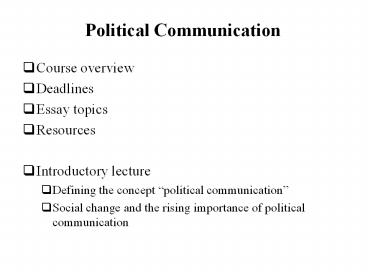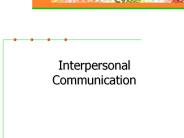Political Communication - PowerPoint PPT Presentation
1 / 12
Title:
Political Communication
Description:
Deliberation, e-democracy, and the virtual public sphere ... Are opinionated, partisan, biased media a problematic source for political information? ... – PowerPoint PPT presentation
Number of Views:2942
Avg rating:3.0/5.0
Title: Political Communication
1
Political Communication
- Course overview
- Deadlines
- Essay topics
- Resources
- Introductory lecture
- Defining the concept political communication
- Social change and the rising importance of
political communication
2
Course overview
- Lecture topics
- Propaganda
- Public relations, political marketing and spin
- Media as political actors
- Media effects
- Election campaigns
- Rhetoric and manipulation
- Foreign affairs and political communication
- Terrorism as/and communication
- Deliberation, e-democracy, and the virtual public
sphere - Truth, lying and bullshit in political
communication
3
Assessments and deadlines
- Tutorial presentation (requirement, unassessed)
- Essay (40)
- Exam (60)
- Deadline for submitting essay (through turnitin)
6 December 2006
4
Essay topics
- Can/should there be limits to freedom of speech?
- To what extent is political speech the defence
of the indefensible? - Would less hostility between spin doctors and
journalists be good for democracy? - Are opinionated, partisan, biased media a
problematic source for political information? - Does a democracy require well informed citizens?
- What are the pros and cons of negative
campaigning? - Are democratic elections anything more than
rhetorical contests? - Can modern wars be won without communication
strategies? - If terrorism is a form of communication, then
whats the message and who is the receiver? - Should we abandon general elections and
substitute them with deliberative polls?
5
Resources
- All titles on the reading list are accessible
online or in the Heavy Demand section of Queen
Mother Library - Search engine
- http//scholar.google.com
- E-journals databases
- http//www.il.proquest.com/pqdauto
- http//www.ingentaconnect.com/search/advanced
- E-journals alphabetical listing
- http//www.abdn.ac.uk/diss/library/ejournal/alphal
ist.shtml - E-books
- http//site.ebrary.com/lib/aberdeenuniv
6
Defining Political Communication
- Chaffee (1975) Political Communication
- the role of communication in the political
process - McNair (1995) Introduction to Political
Communication - Any book about political communication should
begin by acknowledging that the term has proved
to be notoriously difficult to define with any
precision, simply because both components of the
phrase are themselves open to a variety of
definitions, more or less broad. - McQuail (1992) Political Communication in
Encyclopedia of Government and Politics - Political communication refers to all
processes of information (including facts,
opinions, beliefs, etc.), transmission, exchange
and search engaged in by participants in the
course of institutionalised political
activities.
7
McQuails definition
- Communication in the political (constitutional)
system of democratic society - Media fulfilling instrumental functions in
political communications - as a reporter of events
- as a platform for the expression of political
opinion - as an instrument of political party organization
and weapon in inter-party conflicts - as a watchdog on governmental actions
- as an instrument of government for information
and influence
8
Exchange between elites and masses
- Watts (1997)
- understands function of mass media to be that of
intermediaries in the process of political
communication, enabling the government and its
opponents to speak to the electorate and the
electorate to communicate with its leaders - Perloff (1998)
- defines political communication as the process
by which a nations leadership, media and
citizenry exchange and confer meaning upon
messages that relate to the conduct of public
policy.
9
History of political communication research
- Beginning with the study of propaganda during and
between the two world wars - Walter Lippmanns Public Opinion (1922)
- Harold Lasswells Propaganda Technique in the
World War (1927) - Early focus on war/fascist/stalinist propaganda
resulting in a general preoccupation with
persuasive effects of political messages (through
media) - According to McQuail (Mass Communication
Theory), first period of communication studies
(1920s-1940s) characterised by belief in
omnipotence of mass media
10
Social, technological, structural change
- 1940s-1950s first empirical studies of media
effects, in particular campaign studies - Minimal effects model
- Lazarsfeld et al, The Peoples Choice (1944)
- Low levels of information, high levels of
partisanship, habitual voting - Social change since 1960s
- Dealignment
- Technological change
- TV becoming main information medium
- Commercialisation, visualisation, tabloidisation
- Professionalisation of political communication
- Political marketing, campaign consultancy
11
Third age of political communication
- Blumler (2001)
- First age 1950s
- easy access to media, political communication
reflecting partisan positions, reinforcing rather
than persuading, strong and stable political
institutions - Second age 1960s-1980s
- Limited-channel network television, dealignment,
consumerism, public skepticism about elites,
increasing importance of political communication,
and increasingly important role for media in
political process, the modern publicity process - Third age 1990s-present
- Proliferation within and beyond mainstream media,
abundance of channels, unlimited reach,
possibility for interactivity
12
Effects of abundance
- Change in the politics-media relationship
- Limits of efficacy of news management
- Costs vs. benefits of political spin
- Decentralisation, localisation, diversification
of campaigning - Possible reintroduction of political substance at
expense of spin - Hypercompetition
- Populism
- talk-show democracy
- Centrifugal diversification
- Abundance of channels allows to move away from
universal audience appeals towards fragmented
targeting - Internet
- Virtual public sphere
- E-democracy































